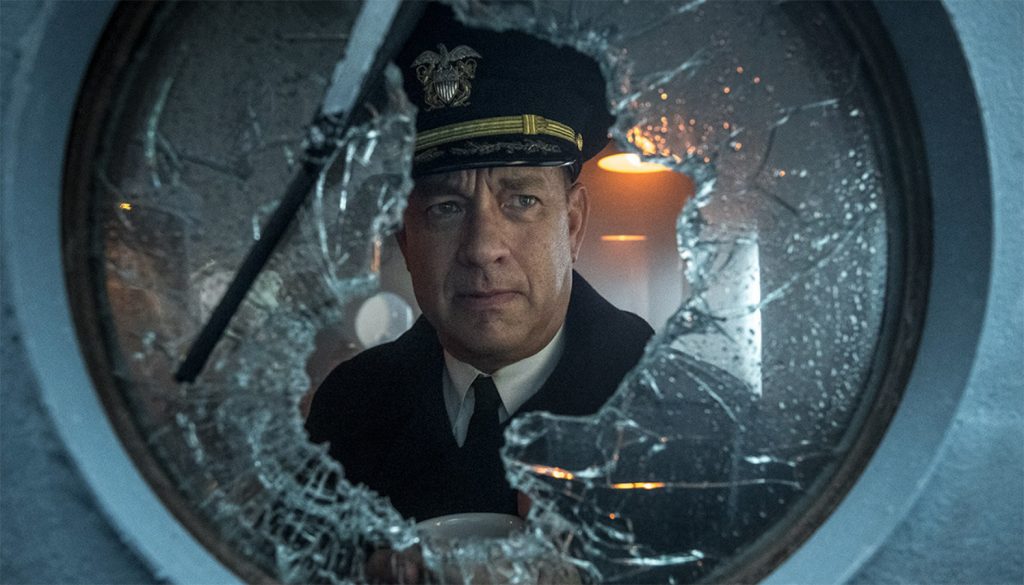In the cold morning light of a cabin window, U.S. Navy Commander Ernest Krause pulls himself out of bed and kneels for a moment of prayer to start the day. The year is 1942, at the height of World War II, and Krause is in charge of leading dozens of Allied ships safely across the sea.
Little does he know that he and his crew face perhaps the 50 most challenging hours of their lives.
So begins “Greyhound,” the upcoming film that offers something unique as far as war dramas go. In just 92 minutes, the film packs in not only thrilling military combat but also an inspiring Christian message.
Written by and starring Tom Hanks and directed by Aaron Schneider, the film focuses on Krause’s first assignment as commander of the USS Keeling — call sign “Greyhound” — to lead a convoy of 37 supply ships across the North Atlantic. The journey includes a treacherous stretch of ocean known as the Black Pit, which lies beyond the range of Allied planes and therefore leaves the ships vulnerable to enemy submarine attacks.
This realm of isolation and uncertainty, especially as it surrounds the devout character of Krause, conjures a striking image resembling a uniquely Christian phenomenon: the dark night of the soul.
Although St. John of the Cross coined the term, many saints throughout history have described this state of feeling abandoned by God and finding no consolation in prayer or virtuous deeds. Such a period of doubt plagued St. Teresa of Calcutta for 50 years, and it pressured St. Thérèse of Lisieux to question her very belief in the existence of God.
As air cover leaves the Allied convoy, German U-boats inch closer, and sunlight fades from the North Atlantic, Krause must face his own dark night, and his response does not come from military strength alone.
On one level, Krause applies every ounce of his own ability to persevere through the trial. Despite his lack of experience in the Black Pit, he leads his men with the confidence and skill of a veteran. Always alert, he roams the ship to hear reports, navigate threats, and give orders to steer Greyhound clear of torpedoes and fire at U-boats. He is so engrossed in his duty and eager to execute it with perfection that he allows himself no time for rest, meals, or complaints as long as danger looms.
But Krause also shows that human skill, however refined, is not enough to carry him across the pit. From beginning to end, his Christian faith does just as much — if not more — to keep him and his crew afloat.
Regardless of circumstances, Krause displays a consistent habit of prayer. He bookends his time on deck with a moment kneeling by his bed, and he pauses in silent thanksgiving before each meal (even if he does not eat it). He leads his men not only in battle but also in prayer as they honor crew members killed in combat. And every time a nearby ship sinks, his contemplative countenance gives every impression of a prayer for eternal rest for the dead, even if they are enemies.
This example of faith in the thick of war sets Krause apart as a leader who, though humanly gifted, knows that he cannot pass through the darkness without drawing strength from above.
However, such strength is not always easy to come by. Although Krause demonstrates a firmly established faith, he is no stranger to hardship and doubt. What initially appears to be a minor hurdle morphs into a seemingly insurmountable crisis, and Krause must struggle to overcome the fear, uncertainty, and pain that thwarts his efforts. But that struggle, rather than diminishing his virtue, actually amplifies it, for it emphasizes that any battle, either external or internal, is most heroic when it is hard fought, and when it calls upon the soldier to persevere against all odds.
What’s more, the outward and inward battles are not separate affairs, as Krause’s experience proves. His prayer life directly affects his relationships. Though demanding, he shows respect for every crew member, from high-ranking officers to the mess mate who serves him. He addresses them by name, and when any of them have performed well, he makes a point of telling them so. Such behavior not only puts his faith in action but also inspires hope and endurance throughout the crew, even in the darkest of hours.
As a result, “Greyhound” proposes something that so many films before it featuring the cliche, fearless American war hero do not: the need for an “interior life” in order to win the battles that matter the most.
To the viewer who’s familiar with that kind of combat, “Greyhound” asks them to believe that when evil threatens and every sense of protection evaporates, faith will always carry us through.
“Greyhound” is scheduled for release on Apple TV+ July 10.

